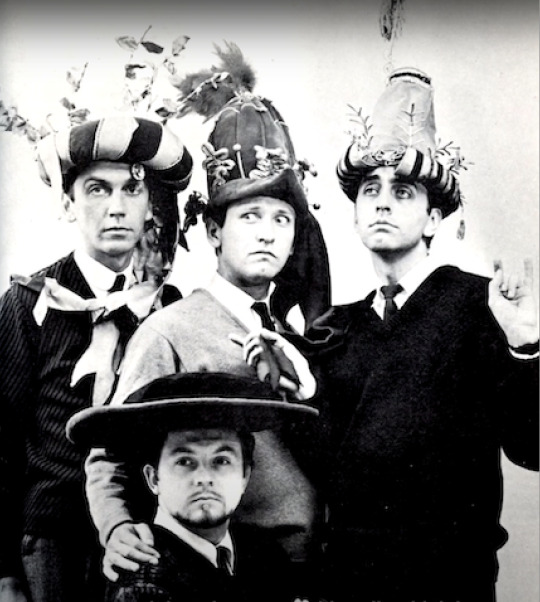#Bohemian Embassy
Explore tagged Tumblr posts
Text




Carol Robinson was one of the Toronto theater community's beloved comedienne's in the 1960s. She was a regular at the Bohemian Embassy and a longtime regular on the many Wayne and Shuster specials on CBC Television.
"Carol Robinson was our comedienne," says actor Barrie Baldaro, a resident performer at the Bohemian Embassy. "She was a very good comedienne in the local scene. I don't think she ever really appeared outside of Toronto. She was sort of a folkie comedienne, but she was very good. Outstanding in revues."
#barrie baldaro#don cullen#carol robinson#bohemian embassy#toronto#history of canadian comedy#wayne and shuster
3 notes
·
View notes
Text
The fight in a Toronto strip club which led on to much, much more (Part 1 of 3)
Back in March, in a follow-up to a piece I posted ten years before (in 2014) I posted a new 4-part blog which started out about a Toronto strip club called Le Strip and then veered into totally true and unexpected tales of Canadian spies, neo-Nazis, double-crosses, counterfeiting, 1980s terrorism, US white supremacists, South African secret agents and much else. All this came from the far-from…

View On WordPress
#armed forces#BJJ#Black Magic#Bohemian Embassy#Brazilian Jiu-Jitsu#burlesque#Canada#club#CSIS#Dave Hughes#Don Cullen#Jim Roberts#Jiu-Jitsu#Joni Mitchell#Le Strip#Leacock Festival of Humour#Margaret Atwood#neo-Nazi#Rhodesia#Ron Hedland#spy#Toronto#Winnipeg Folk Festival#York Regional Police
1 note
·
View note
Text
Bohemian Embassy | 1169 & 1171 Queen West
Bohemian Embassy | 1169 & 1171 Queen West
According to Vogue, Queen West is the “Second Coolest Neighborhood in the World”*! So I guess that means Queen West is the coolest Neighborhood in Canada! Who wouldn’t want to live in the coolest neighborhood! One of my favourite condos in the Queen West area are The Bohemian Embassy Flats and Lofts.
If you drive along Queen Street West now you’ll see lots of activity and commercial development:…
View On WordPress
0 notes
Video
youtube
0 notes
Link
Margaret Atwood, the Queen of Canadian Lit, discusses and reminisces about the budding poetry scene at Bohemian Embassy in Toronto during the 60`s. Sounds like a place I would read at. Given to you via CBC Archives. Very articulate woman.
Currently I am ready Atwood`s Wilderness Tips (a collection of superb short stories). Isis in Darkness (story) reiterates the days of the Bohemian Embassy, which got me into researching old Toronto counter-culture landmarks. Apparently this place no longer exists and gentrification has turned one of the old sites (on Queen W.) into over priced lofts and condos. Gross but it was once a creative cesspool of poets, folk singers, bohemian rugrats, and avant garde theatre performers.
Here is a link of production notes in PDF from a documentary that explains the impact that Toronto`s Boho Embassy had on the Canadian Literature scene and gives bios of the Boho players (including M. Atwood): http://behindthebohemianembassy.com/publicity.pdf
1 note
·
View note
Text
To BE, or Not To BE?
Once a factory, then home for dozens of artists, 48 Abell is being demolished this week—condos will be built on top of it. This great thesis [PDF], by Michelle Van Eyk, is worth reading for anyone interested in the property, West Queen West, the Drake, or how Toronto gentrifies. From it, I've learned that in 1912, Toronto city council banned apartment buildings, because they were "breeders of slums." And that 1990 (or so) was the West Queen West tipping point, when artistic uses of buildings overtook industrial ones. And that before Parkdale was part of Toronto, it and five railway companies financed the building of the Dufferin underpass without the City's help, which "contributed greatly to…[its] debt."
Probably best of all, though, was learning that among the original promotional materials for that butt-ugly Bohemian Embassy development along Queen near Gladstone was a poem.
This is how it went:
How to BE Wear a beret. Be the only employee of your own company. Play the bongos. Write poetry. And don't be afraid to read it out loud. Don't wear a beret. Start an art gallery. Wear vintage clothing. Own a cool car. But take the subway. Know the names of all the street musicians on Queen West. Live at the Bohemian Embassy.
It is very, very hard to think of anything less authentic or bohemian than "Own a cool car. But take the subway."
2 notes
·
View notes
Text
Welcome to Queen St., Piola
Piola, the Italian pizza joint with stores around the globe will soon open its first Canadian location in West Queen West.
There is signage announcing the chain's imminent arrival on Queen St. near Gladstone Ave., in one of the new retail spaces at the foot of the Bohemian Embassy condo buildings.
The brand began in Italy in 1986, and has since expanded into North, South, and Central Americas.
Here's how the brand describes itself, on the company's website: "Rigourously Italian," "simple and healthy," "very creative," and "opening its doors to culture, hosting film premieres, book and magazine events, art exhibitions..."
If the marketing materials reflect the actual experience of Piola, it sounds like a good match brand-wise for West Queen West.
But the competition for thin-crust pizza on Queen St. has reached a fever pitch. Can Piola compete? Watch this space to find out.
0 notes
Audio
Number Three , These Guys are also pure epicness with this song i love how catchy the lyrics are
Love peace , Hate war ;)
#Bohemian Embassy#Bohemian#embassy#Look East#Indie#Rock#Catchy#Love#Peace#Hate#War#Love peace#hate war#telepathy
1 note
·
View note
Photo

1169 & 1171 Queen St W | July 2011
6 notes
·
View notes